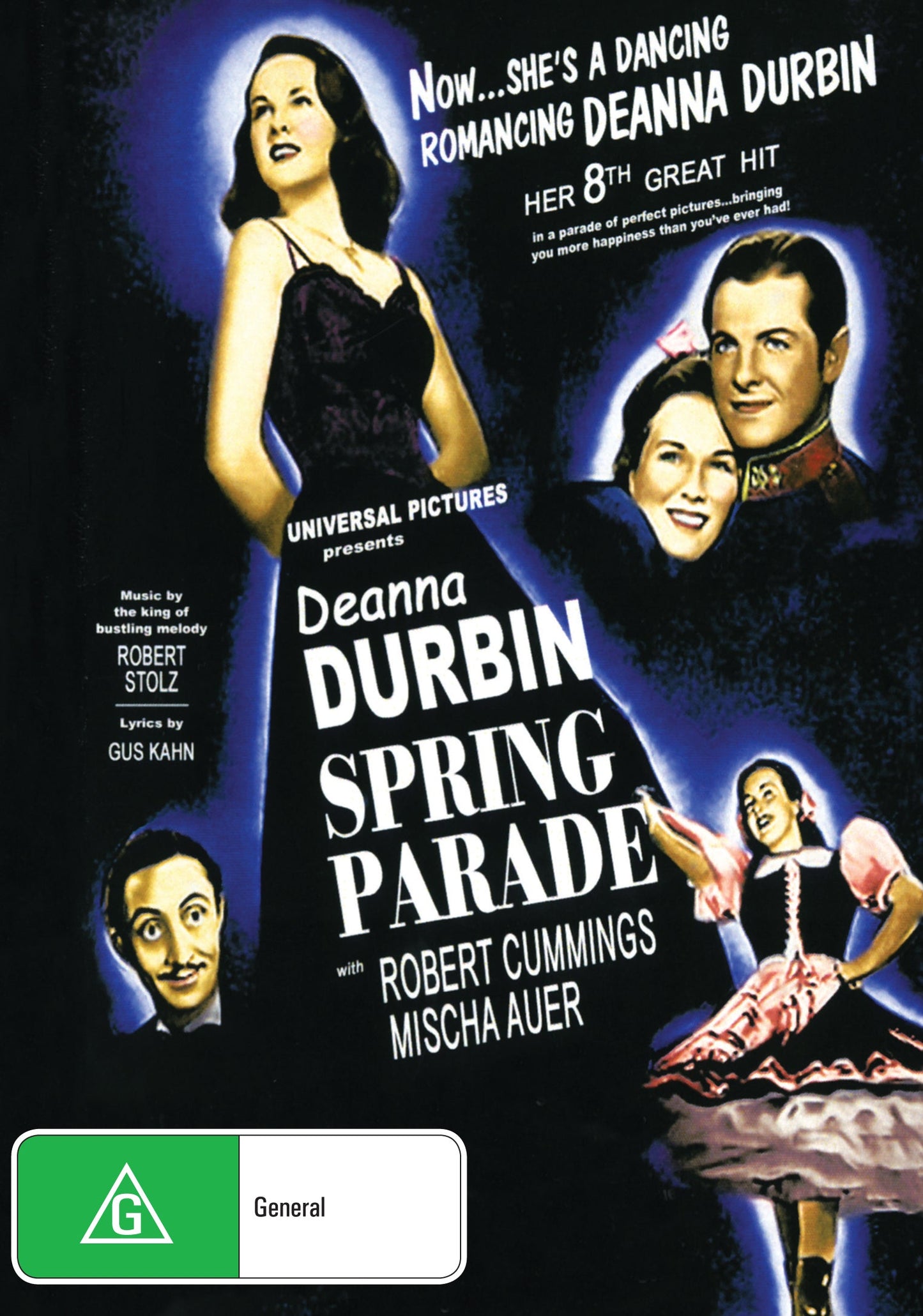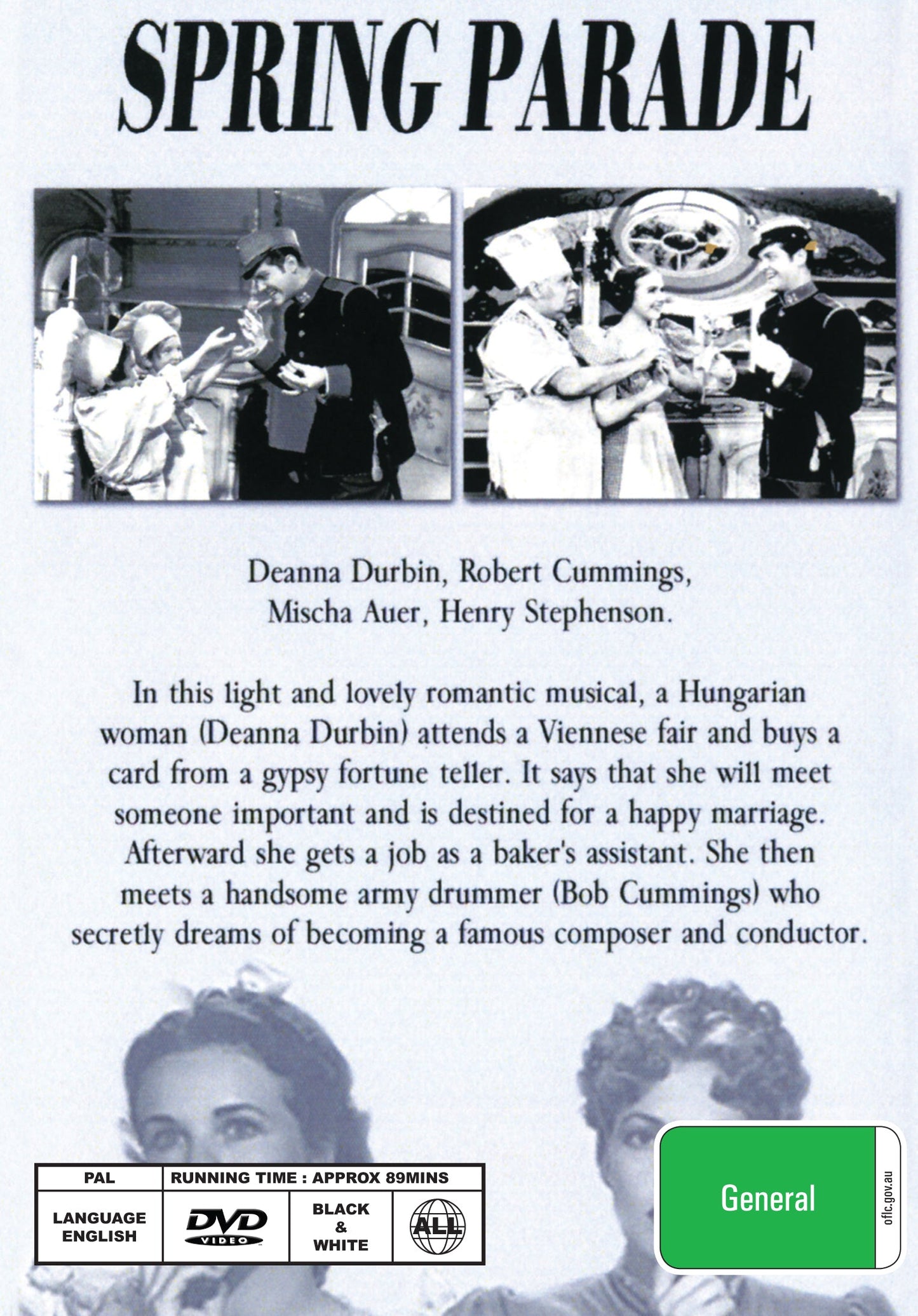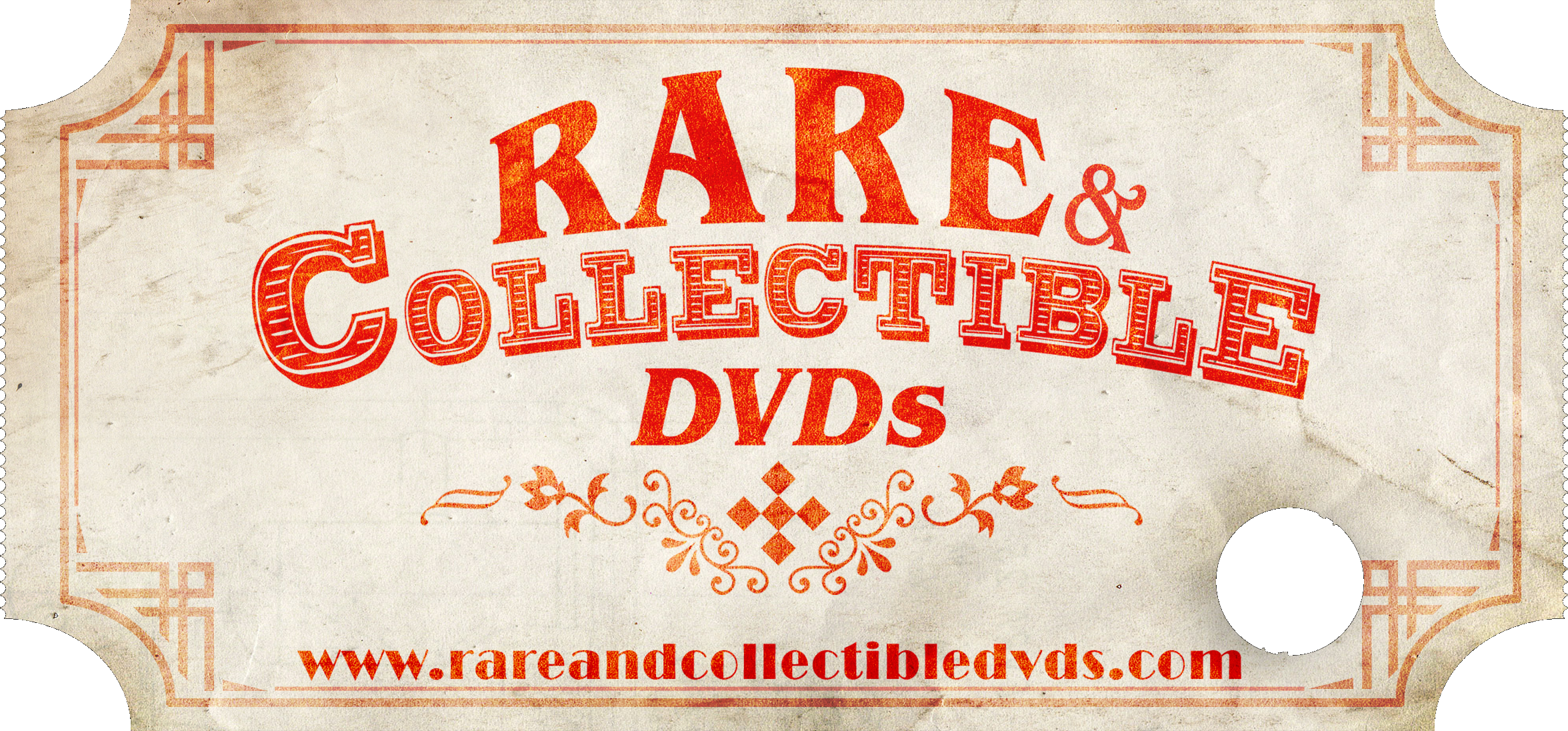Timeless Classic DVD
Spring Parade
Spring Parade
 Before you ORDER please check do you wish to order a DVD or a Digital Download file
Before you ORDER please check do you wish to order a DVD or a Digital Download fileFor DVD use the GET DVD Button
For a Digital Download use the DOWNLOAD Button
Couldn't load pickup availability
In this light and lovely romantic musical, a young Hungarian woman (Deanna Durbin) attends a Viennese fair and buys a card from a gypsy fortune teller. It says that she will meet someone important and is destined for a happy marriage. Afterwards, she gets a job as a baker's assistant. She then meets a handsome army drummer (Robert Cummings) who secretly dreams of becoming a famous composer and conductor. Unfortunately, the military forbids the young corporal to create his own music. But then Ilonka (Durbin) secretly sends one of the drummer's waltzes to the Austrian Emperor with his weekly order of pastries. Her act paves the way toward the tuneful and joyous fulfillment of the fortune card's prediction.
STARS: Deanna Durbin, Robert Cummings, Mischa Auer
89 min | Comedy, Musical, Romance | 1940 | Color
Movies with low demand and/or out of print are manufactured-to-order using high quality recordable DVDs. Please read FAQs if unsure, or send a query.
All DVDs are Region 0 and are guaranteed to play on any DVD player in any country in the world
Satisfaction Guarantee – if you are not satisfied with any aspect of your purchase then we will explore all options to rectify the issue
COMBINED POSTAGE: ONLY CHARGED FOR THE FIRST DVD ALL OTHERS IN A MULTIPLE ORDER ARE POST FREE
Postage: Free In Australia.
Postage: Rest Of The World at Table Rate
All DVDs come in a DVD case with color artwork and printed disc
All DVDs are available as an MPEG4 file sent to you via an email link. Save on postage and waiting time. Transfer can take up to 12 hours depending on the time zone you are in.
Excellent Movie
It's a crying shame the studio never released this on video...I have seen this movie and it is easily one of Deanna's best! Durbin comes off with even more of her famous spunk and "atitude" that we all know and love. Her supporting cast is first rate and the songs really add color and warmth to the picture. Set in Vienna Austria,this is the only movie where the storyline is contained fully outside of the USA. It happens to be Deanna's shortest film but it is not lacking in the entertainment department as it will have you chuckling constantly especially the beginning of the movie where Deanna's character Ilonka tries to sell her goat!
Excellent Durbin Film with a Sad History
Deanna Durbin sang with one of the most beautiful voices ever recorded. This film generously preserves some fine samples of that fact. But perhaps the prospective viewer should know that its story line is much simpler than film stories today where intricate plot twists and violent thrills are expected. Director Henry Koster crafted a sweet comedy about a superstitious, but strong-minded country girl who is fated to meet a self-centered, but talented, corporal who tries to act like a big shot. Henry Koster proves his craftsmanship in his ability to knit together so simple a story and make it interesting and even, in places, arresting. Durbin plays a Hungarian peasant from Szilagy-Somlyo. (It's fun to hear her say it! It happened to be producer Joe Pasternak's childhood home town. Also, how amusing it is to see Durbin, an "All-American Girl," dressed up rather like Eva Braun! Durbin is so beautiful that it does not matter.) The title SPRING PARADE makes no sense to the story line, and that is a clue to understanding the larger, but sad, history of this film. The truth is that the film was first made by Pasternak in 1934, when he produced movies for Universal Studios in Austria and Hungary. Today the first film is identified by either of two names, FRÜHLINGSPARADE or FRÜHJAHRSPARADE, which mean "spring's parade." It tells a probably somewhat fictionalized story of the composition of a famous Austrian military march, the "Deutschmeister Regiments Marsch" by Wilhelm August Jurek in 1893. In the story Jurek is inspired by the rhythmic tapping of his girlfriend in an open-air Viennese restaurant. The climax of the story comes at the end of the film when Emperor Francis Joseph I praises the march while reviewing his troops. Jurek's regiment plays it while passing by. The title SPRING PARADE in that context makes sense. In the Durbin version, the march is replaced by the composition of a waltz. In 1934, Hitler had been chancellor only a year, and a story about a popular march from 1893 was unexceptional. By 1940, however, a movie about a rousing German march would be exceptional. The year 1893 gives the viewer of SPRING PARADE a peg to hang the story on. Now we know that it comes after the assassination of the Empress Elisabeth (Sisi). It adds poignancy to the scenes of the lonely emperor in his royal apartments. In the 1934 film, Joe Pasternak made a big mistake. The screen credits attributed the story to Ernst Marischka, but, in fact, Marischka wrote the screen play from an original story by Ernst Neubach, who was not credited. After World War II, Neubach settled in France. In 1949, he sued Universal Studios for violation of his copyright, and won. Universal Studios lost all rights to, what was for them, a most cherished film. And it disappeared from the public square. No studio-made VHS, DVD, or Blu-Ray disc has ever appeared. One can reasonably wonder about its current status as a property. Has it passed into the public domain? In 1955, FRÜHJAHRSPARADE was remade in color by Ernst Marischka with the title DIE DEUTSCHMEISTER, starring a young Romy Schneider. Wouldn't it be nice if, say, a manufacturer like the Criterion Collection would release a three-film set with FRÜHLINGSPARADE/FRÜHJAHRSPARADE (1934), SPRING PARADE (1940), and DIE DEUTSCHMEISTER (1955), all restored with extras like sections, subtitles, and commentary? Detailed information about SPRING PARADE can be downloaded in PDF format from the academic journal Modern Austrian Literature, Volume 32, Number 3 (or 4), 1999, Special Issue: Austria in Film. The paper is "Spring Parade (1940): Imperial Austria Lives Again (at Universal)," by Jan-Christopher Horak, pp. 74-86. The Packard Campus of the National Audio-Visual Conservation Center of the U. S. National Archives at Culpeper, Virginia, owns a copy of SPRING PARADE, and they have given it at least three public showings. It is probably a clean positive without breaks. The music of SPRING PARADE is significant, with a fine march, two waltzes, and a comic song by Prof. Robert Stolz from 1934. The talented Gus Kahn contributed new lyrics to the music that Durbin sings. Charles Previn of Universal added his own march, which is very fine and needs to be heard today. Finally, Mr. Kahn wrote lyrics to Hans J. Salter's "Blue Danube Dream," which re-works the "Blue Danube Waltz." Durbin's performance of this is magnificent. Just on the music alone this film has cultural significance. It and its sister films should be conserved, restored, and seen again as they were meant to be seen.




